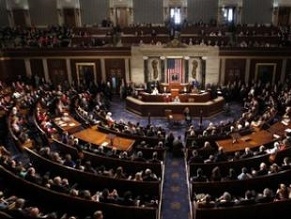|
World Jewish News

113th Congress in Washington Photo: REUTERS
|
Partisan tactics in the US mark new effort to pass Iran nuclear sanctions bill
26.02.2014, Israel and the World Republicans in the US Senate are trying to revive a stalled bill that would trigger new sanctions tools against Iran should negotiations over their nuclear program fail this year.
With a majority of members now against a vote on sanctions while talks between Iran and world powers are still underway, Republicans are now attempting to add the text of the bill as an amendment to unrelated legislation.
On Wednesday, Senate Minority Leader Mitch McConnell (R-Kentucky) said he hoped to attach the sanctions language to a bill expanding healthcare and education programs for veterans of the wars in Iraq and Afghanistan. And on Tuesday, a similar suggestion was made by Senator Jerry Moran (R-Kansas) regarding a bill reforming military practice on sexual assault.
This as French officials told The Jerusalem Post that new action from Congress would be "counterproductive" to the diplomatic process in Vienna between the permanent five members of the United Nations Security Council, the EU and Iran, threatening to undermine implementation of an interim agreement reached last November in Geneva that temporarily freezes their nuclear work.
The French spoke on the condition of anonymity due to the sensitivity of engaging in foreign political debate.
The Republican tactic, used frequently by the party in the minority, is not guaranteed to work-- but may be their best chance to debate the bill on the floor, after Senate Majority Leader Harry Reid (D-Nevada) declined to give it a vote at the height of the bill's popularity.
Since the Nuclear Weapon Free Iran Act of 2013 was first introduced in December by a bipartisan group of legislators, US President Barack Obama has threatened to veto it, warning new action in Congress would undermine the Geneva agreement. Shortly after that threat, Democratic support began to wane; the bill's chief author, Senate Foreign Relations Committee Chairman Robert Menendez (D-NJ), backed off his call for a swift vote; and the American Israel Public Affairs Committee retreated on its push, fearing a partisan divide on the historically bipartisan issue.
AIPAC holds its annual policy conference next week, where debate over the bill will have a public forum, if not an official one.
"A broad bipartisan majority in the Senate would like to vote on Iran sanctions," McConnell insisted on Wednesday. "The dilemma we have here is that the majority leader does not want this vote to occur."
McConnell called the vote "time-sensitive."
Meanwhile, new figures from tracking agencies show that Iran's oil exports increased yet again in February by over 100,000 barrels per day, to up to 1.30 bpd for the month, calling in to question the integrity of the international community's existing sanctions infrastructure after the Geneva deal.
Israel's ambassador to the United States Ron Dermer tweeted on Tuesday that "pressure on Iran is dissipating," citing the figures.
India also doubled its crude imports from Iran in the month of January.
JPost.com
|
|
